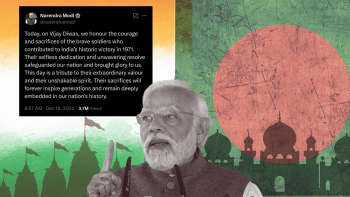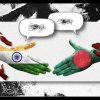The Stockholm syndrome in South Asian politics

The political landscape of South Asia has become increasingly disoriented, marked by the rise of populist political extremism influenced by various ideologies and religious sentiments. This troubling trend poses significant challenges to the region's aspirations for growth and development. Major power centres and strategic pivots, such as Dhaka, Delhi and Islamabad, seem to have lost their way in striking a balance between the short-sighted political objectives of the ruling elites and the collective goal of fostering equitable relations among neighbouring countries.
As Henry Kissinger once noted, "If you don't know where you are going, every road will get you nowhere." That's exactly where the region stands at the moment.
This cluelessness has become more apparent with the fascinating and transformative events we witnessed in 2024, which brought about remarkable changes, with Bangladesh in the global spotlight due to the student-led mass uprising in July-August that shook the country's political, economic and social foundations. Dhaka is poised to change its traditional foreign policy, which has much to do with the public aspirations and the uprising that will reconfigure the South Asian geopolitical ecosystem.
Dhaka is set to recalibrate its neighbourhood policy based on the July uprising, leading to more equal-handed relations with Delhi, improved ties with Islamabad, fostering energy and trade ties with Kathmandu and Thimphu, and strengthening maritime interests with Male and Colombo. In global terms, balancing between two superpowers—the US and China—would be a rational option, but the Trump administration will likely forge the government to tilt towards alliance politics in 2025 and beyond.
Hence, the challenge of sustaining a new foreign policy approach is astronomically high, coupled with the precarious political fluidity in Dhaka that may become more ebbing and flowing in 2025.
India's Prime Minister Narendra Modi's political and spiritual invincibility was challenged during the 2024 Indian general elections. His most trusted aide, former Bangladesh Prime Minister Sheikh Hasina, ingloriously left the country, which fundamentally changed Delhi's relations with Dhaka. The Bangladesh which Modi's BJP has known for the past 15 years is gone for now.
At the same time, the rapport between US President-elect Donald Trump and Modi is seen as a mellow transactional love. However, the Trump administration 2.0 is likely to be more conservative and transactional than to show mellow love in global politics. That will make the Chinese dragons breathe more fire.
Understandably, Delhi could go to Washington with its cheerleaders to claim its relevance as a regional power, showcasing Dhaka as plagued with extremism and Beijing as a strategic threat despite Delhi-Beijing trade relations favouring the Mandarin economy in perpetuity.
On the western front, Shehbaz Sharif's Pakistani government continued to confront challenges from the economy, Kabul, and now the unsettling ties with Tehran. To anyone's utter surprise, the mighty ISI's former chief, Gen (retd) Faiz Hameed, has been taken to serve his time in the slammer, exposing a new civil-military equation unfolding in Islamabad. Imran Khan will remain the catalyst as his rejection of any deal with the Pakistani establishment sets a clear message of political turbulence for Islamabad.
The evolving dynamics of the Afghanistan-Pakistan-China triad are likely to further heighten Delhi's perceptions of insecurity in the near future. Still, the good part is that Delhi and Beijing reached a border rapprochement deal in October 2024 to resume patrols in Ladakh and disengage troops. My good friend Michael Kugelman thinks "these developments provide a chance to inch ties forward."
On the southern front, the Maldives expelled Indian troops from the country due to Delhi's overstretched, undiplomatic comments on the Maldivian parliamentarians, enabling Beijing to gain more muscular, if not firmer, footholds in the Indian Ocean. Sri Lanka elected a left-leaning president—Anura Kumara Dissanayake—marking a historical shift from seven decades of traditional old guards of politics to a new generation of political ideologues.
The northern front comes with Thimphu-Beijing border relations that have remained complicated despite the border negotiations, highlighted by Beijing's strategic decision to permit settlements near the crucial Doklam plateau since 2020. Thimphu is gradually expanding its international presence beyond its traditional China-India orbit. A significant milestone will occur in January 2025 when Ed Sheeran becomes the first Western artiste to perform in Bhutan. In Nepal, KP Sharma Oli has reclaimed the prime ministerial throne for the fourth time. Yet, the tradition of political musical chairs may continue in Nepal's politics in 2025. Oli's pro-Beijing tilt will likely continue until he hands over power to Nepali Congress President Sher Bahadur Deuba. Oli's cabinet approved a new 100 Nepali rupee note showing Nepal's unilaterally drawn new map—the map India has already termed "untenable" and "artificial enlargement."
And, of course, the eastern front, the key zone for the looming uncertainties, comes with a potent mosaic of insurgencies and conflict owing to Delhi's weakening position in the Indian northeast and Myanmar. Delhi and Beijing's ally, the genocidal military of Myanmar, may lose control over most of the Burmese sovereign territory to the ethnic armed groups. It won't be surprising for Dhaka to see Bangladesh getting new neighbours, if not in 2025 but later. Indeed, Bangladesh, for the first time in its 53 years of history, has a non-state actor—the Arakan Army—as its border counterpart.
That means that in 2025, there will be more diplomatic and strategic paranoia in Dhaka, Delhi, and Beijing. I can't help but bring back Kissinger again: "Even a paranoid can have enemies." But the caveat is in the new variant of political Stockholm syndrome that Dhaka and Delhi suffer from. The variant lies in mental ensnarement through new technologies to promote misinformation and disinformation, which spread through tabloid media, online, and propaganda news for which South Asian media have earned quite a reputation.
While Delhi's economy significantly relies on Beijing's prejudice, the BJP spares no stone unturned in projecting Beijing as an existential threat, shifting its habitual focus from Islamabad's nukes or the Talibans in Afghanistan. Dhaka sees Delhi as a gross violator of diplomatic sensibility by attempting to destabilise its internal affairs. Still, Bangladeshi political elites can't unplug themselves from their perception of India as a power. The political tycoons—be they Hindutva or Islamist nationalists, revolutionary romantics, or perhaps traditional ones—would continue to expose their variants of Stockholm syndrome in 2025.
Dhaka's foreign policy community should remember that Bangladesh's current political landscape, if marked by a looming divide over national interests and ideologies, could invite more involvement from external actors in 2025. We are in for an eventful year ahead, filled with expected and unexpected political twists and sabotages, geopolitical shifts, economic shocks, and regional tensions. The sooner the country gets its national consensus on its international affairs, the better it will be at protecting its national interests and reducing the Stockholm syndrome.
Let's stay positive, though, and prepare for what could be a politically riveting and geopolitically perplexing journey through 2025 for Bangladesh and its neighbours!
Dr Shahab Enam Khan is executive director at the Bangladesh Center for Indo-Pacific Affairs (BCIPA) in Jahangirnagar University.
Views expressed in this article are the author's own.
Follow The Daily Star Opinion on Facebook for the latest opinions, commentaries and analyses by experts and professionals. To contribute your article or letter to The Daily Star Opinion, see our guidelines for submission.


 For all latest news, follow The Daily Star's Google News channel.
For all latest news, follow The Daily Star's Google News channel. 






Comments